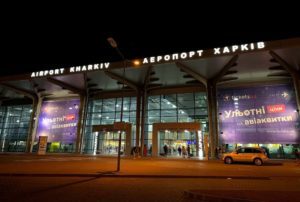Number of unemployed in Ukraine and job opportunities in dynamic from Dec 2018 to Dec 2019 (graphic)


Kharkiv International Airport in February 2020 increased passenger traffic by 57% compared to the same period in 2019, to 103,400 people. According to the airport’s Facebook page, the total number of departures was 421. The most popular destinations were Sharm el-Sheikh (Egypt), Istanbul (Turkey), Boryspil (Kyiv), Krakow, Warsaw, Gdansk, Katowice, Poznan, Wroclaw (all Poland), Vienna (Austria).
As reported, the passenger flow of Kharkiv International Airport in 2019 increased by 40% compared to the same period in 2018, to 1.3 million people.
Kharkiv airport has a runway 2,500 meters long and 50 meters wide. Two passenger terminals with a capacity of 100 and 650 people are located on its territory.
National bank of Ukraine’s official rates as of 06/03/20

Source: National Bank of Ukraine

Ukrainians in January-February 2020 registered 61,000 imported used cars, which is almost 4.4 times higher than new car sales (14,000 cars), Ukrautoprom has reported. In January-February of 2020, the most popular passenger car among imported used cars was Volkswagen Passat with 3,585 cars registered.
Renault Megane (3,485 cars) took the second place, Skoda Octavia was in the third place with a result of 3,307 cars, then Volkswagen Golf (2,675 registrations) and Ford Focus with 2,310 registered cars.
As reported, in 2019, due to the provided legislative preferences, the primary registrations of imported used cars grew by 3.3 times from 2018, to 400,597 cars, while the new passenger cars market grew by only 14%, to 78,386 cars.

A’spik Group (Khmelnytsky region), a regional sugar producer, plans to expand dairy farming and increase milk production in 2020 by launching the third dairy farm of Agro Eco Milk LLC with 600 animals in the village of Irshiki (Khmelnytsky region).
The group said on Facebook that two farms of Volovikov agricultural enterprise LLC (Rivne region) and Kuzmintsy agricultural enterprise (Khmelnytsky region) produced 15,300 tonnes of milk last year.
“The average milk yield at the first enterprise last year was 35 tonnes per day, at the second 7 tonnes. The dairy cattle stock at the farms totals 1,600 and 270 cows, respectively,” A’spik Group noted.
It said that now 80% is extra-grade milk, another 10% is milk of the highest and first categories.
The core business of A’spik Group is sugar production, growing sugar beets, grain and oilseeds. According to the group, two of its plants produce about 5% of the total sugar volume in Ukraine.
A’spik Group in 2019 increased sugar production by 20% compared to 2018, to 72,000 tonnes. Of the total production, 46,000 tonnes of sugar was produced at Starokostiantynivsky sugar plant, and 26,400 tonnes at Shepetivka sugar factory.